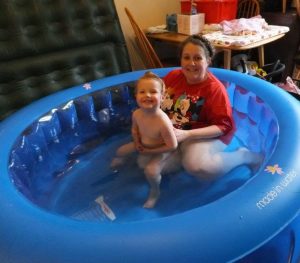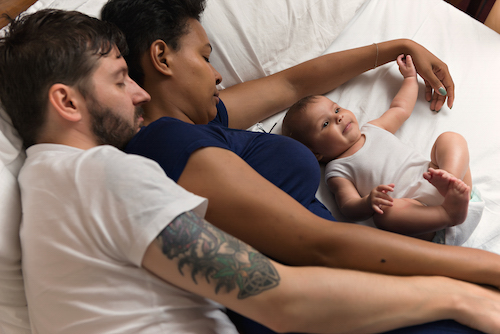
Big Birthas – A Q&A on pregnancy and childbirth in mothers with a higher BMI
We were really pleased to talk to Amber Marshall from BigBirthas.co.uk  this week. Amber’s website provides information and support to mums and mums-to-be with a higher BMI.
this week. Amber’s website provides information and support to mums and mums-to-be with a higher BMI.
Image: operabug (CC BY-NC 2.0)
PSG: Thanks so much for joining us Amber. Can you tell us a bit about why you started the Big Birthas website?
Amber: Hi there! I started the website after my own experiences in pregnancy. My first was a straightforward one, but being a first timer, I didn’t know what to expect and mostly went along with the flow. I met some lovely HCPs (Health Care Professionals) but also some downright horrible ones.
Anyway, I experienced no complications due to my size, despite suggestions that I should expect them – a pretty straightforward pregnancy. I knew I couldn’t use the midwife-led unit, but I chose the hospital I did because I knew they had a birthing pool in the delivery suite, and a water birth was very important to me.
I went on a tour of the unit, saw the pool, everything. Turns out I labour really well, too well! – very cheerful, calm, keep getting told I’m not established until they do a VE (vaginal exam) and discover I’m very MUCH established!
But I was fobbed off for the whole day about when I could get into that pool. I had 3 baths in a very cramped hospital bathroom, though! It was only when I was 8cm dilated that they told me I wasn’t going to be able to use the pool after all.
I was FURIOUS!!!!
And the labour took a downward turn from there – I was told the baby was in distress shortly afterwards and I needed to birth her quickly or I’d be rushed of for a caesarean. I’m convinced that the surge of adrenaline and cortisol I would have created caused that.
For the next pregnancy I knew I didn’t trust the hospital any more, so I did ALL the research I could – but the only website I could turn to was US based, I was irritated that there was no UK/NHS centric site for big mums.
Then I realised I’d have to do it!!
My next birth was a home birth and it was FABULOUS!!
PSG B: Amber, thank you for normalising larger pregnant bodies. Being treated as a ‘problem to solve’ was a huge part of my pregnancy. You helped me advocate for myself. Much, much appreciated xx
Amber: I’m so glad. It’s tales like yours that make me so glad I worked out how to do web design!!
PSG K: Do you think there is an issue that some HCPs convince themselves that a high BMI pregnant woman already has complications XYZ without any real evidence? It feels that this was the case during my first pregnancy. I wish I had known about your site!
Amber: Yes, sadly I do. I’ve heard of some women being compelled to take glucose tolerance test after glucose tolerance test because their HCP doesn’t believe they couldn’t have developed Gestational Diabetes.
Or just an overriding feeling that we’re automatically going to be a ‘problem’ patient the minute we walk through the door…
Many HCPs aren’t like that at all. The trouble is, you only have to encounter one or two for your pregnancy to lose it’s magical shine so to speak, and for you to feel under attack and like you’re a bad mother.
Pregnancy is the most wonderful and special time. You’ll never forget it. I think some HCPs have sadly become a bit jaded and we become numbers on a list.
The worst instance I heard of (and sadly, I don’t know what happened) was a British woman contacting the US site I used to frequent before I set up bigbirthas.co.uk saying she was considering terminating her baby so she could lose weight to give it a better chance.
She’d just come out of a really soul-destroying midwife appointment…
PSG L: Gosh how awful ??
PSG M: Oh that’s so sad
PSG A: I’d be interested in your views on what I can say to a midwife who has said that I can’t have a home birth due to my BMI. I know that I CAN by law, but she’s said that I am at a higher risk of post partum bleeding.
PSG B: My NHS trust had a ‘normality midwife’ (hilarious job title) and I had a few really good meetings with her to co-write a compromise plan that I would agree with and she could support with consultants etc. Good luck!
Amber: Yes, you are at higher risk of post partum bleeding. (I wish I knew the stats off the top of my head). But highER doesn’t mean high.
If I were you, I’d go into the next consultation knowing the stats, knowing the indicators, knowing the additional risk factors, knowing the potential strategies to counter act if a postpartum haemorrhage did occur and see what they say.
PSG A: It’s 4.7% for normal BMI and 5.2% for over 40 I think. No significant bleeding after having my first child.
Amber: I had to have a meeting with the Head of Midwidfery (who was lovely) who I had to sign off a birth plan stating that I understood that I was taking a risk and that I was undertaking a home birth against medical advice.
She (and her team) were incredibly supportive, and said that actually, given my previous pregnancy and birth she expected that everything would go smoothly (it did), but that sadly, she had to get my signature on that particular piece of paper.
We had lots of ‘what if’ strategies in place. It helped that I’m literally 15 minutes walking distance from a hospital with a delivery suite.
PSG A: Thank you Amber, I understand. I guess I’ll see how I get on next time I see her.
Amber: Worst case scenario you can still do a home birth without their consent – as you say, it is your legal right! But better to have them on side if poss.
I found the midwives much more sensible re BMI and treated me based on my circumstances, not a line on a chart. It was the consultants (particularly the women, in my case!) who were bloody horrendous to deal with and didn’t like me challenging their orthodoxy.
I did transfer my care to a different hospital team mid-pregnancy, when I discovered that that team was more sympathetic to plus-size home-birthers.
PSG C: Do you think it’s common for the hcps to look at the numbers and not the person?
I was placed under a consultant due to high BMI and my mother’s history of high blood pressure (I’ve only once had a high blood pressure reading). The consultant stated I was to be constantly monitored during labour without even seeing me. I booked an appointment later and we reached a compromise, and I got an active labour.
Amber: Oh good god, yes! That’s what drives me nuts.
We’re expected to jump through all these extra hoops because some women develop problems. But not all of us do!
And many of the problems stem from one another – if you don’t get one, you’re less likely to get the next, but still the hoops are put in front of us and the barriers raised for us to beat down!
PSG C: I had the guts to stand up for myself, but not all women will. I too wanted a water birth but the pool was in use when we arrived so I was thwarted for non-BMI reasons on that one.
I also remember doing lots of research regarding hoists and lifting as I’d read something about some women not being allowed in a pool in case something happened and the HCPs needed to get them out.
Amber: That’s fair enough. I always knew if someone else was in it, I’d be stuffed. But I was told (no word of a lie) that:
“Oh, I think someone’s fixing it”
“Oh, someone was in it earlier, it’s being cleaned.”
“You can’t can you? You’re not allowed?” (This was a trainee midwife right at the beginning, who I never saw again, turns out she was right all along!)
“There’s a problem with the water…”
Seriously, there’s nothing like rapport building with people who are blatantly lying to you!!
I was 8cm dilated when I was finally told firm and certain no – at which point I was saying to my husband “Right, what are my options? Can we transfer to another hospital?” and he’s looking a bit panicked and going, “Errm, no, you’re 8 cm dilated… think the baby will be here soon?!”
PSG D: Luckily I could go to the birthing centre and use the pool (though actually it was too quick!)I was sent to see the dietitian rather than it being the offer it should have been. I was under a consultant because of my age and weight and anti-depressants.
I was expected to have blood sugar issues.
Amber: ‘Expected’ is the word I’d use too. I was actually really surprised first time round that I didn’t get Gestational Diabetes. It was only later I discovered that I was 90% likely NOT to get it – I’d just been sucked into the higher risk hype!
PSG D: I weighed less after giving birth than at my booking in appointment. I knew I was effectively losing weight because my weight was static for quite a while but the bump was growing. I was told it was BMI at booking in only that was considered.
PSG A: Yes! Me too – I’m sure it will be the same with this pregnancy as I have already lost 10lb to sickness and reduced appetite.
PSG C: Me three!
Amber: Me four!!
It’s actually really common for plus-size women to stay static or lose weigh in pregnancy.
Although, if they did change the goal posts based on weight loss, that might encourage some to actively try to lose weight during pregnancy, which you don’t want either.
I felt too sick in early pregnancy to want to eat anything and too full in late pregnancy to want to – no wonder I lost weight!
PSG E: Is there any work done on outcomes for mothers with high BMI who ‘lose weight’ during pregnancy v those who don’t? I’m thinking about things like rate of Gestational Diabetes etc.
Amber: Not that I’m aware of. You’d have to be very, very careful how that message was delivered. It might encourage some to actively try to lose weight during pregnancy, which is known to be dangerous for fetal development.
PSG E: Good point. I have friends whose lower weight post-pregnancy compared to pre- was mainly caused by things like cutting out drinking, and making a decision to eat more ‘healthily’. I’m interested to know whether that might have any bearing on baby/mother outcomes. (obv stopping drinking…).
PSG F: Amber, you’ve said on your blog that we really need more research into this area. What is your wish list – what research would you want to see done if you could wave a magic wand and make it happen?
Amber: Wow.
Well, for personal and selfish reasons, given that water birth and home birth were what kicked this off for me, I’d really like a review of the statistics on plus-size women having water births and home births.
Because we ARE having them, but there’s no evidence base. There’s no evidence they’re less safe, just as there’s not evidence that they’re more safe!
I’m convinced that some of the risks we’re repeatedly bashed over the head with might actually be ameliorated by access to water. I’m particularly thinking about high blood pressure – we know water reduces this. Also ease of movement in labour- important for active labour – movement IS easier in water. And as bigger women, we’re MORE buoyant, for goodness sakes!
PSG C: But yet so many consultants seem to want high-BMI mums constantly monitored, which means being stuck on a bed if mobile monitoring equipment isn’t available ?
Amber: Yup, and bang goes your active labour. Then you’re told you’re not progressing fast enough. Then you’re losing the battle and feeling overwhelmed and that you can’t trust your body.
Before you know it, you’ve had an emergency caesarean and you’re yet another high BMI mum adding to those stats.
Another research topic could be a very simple “Have you experienced negativity from HCPs during your pregnancy?” Sadly, I’d be surprised if the answer wasn’t yes for 90+% of high BMI women.
PSG G: Amber do you have a sense of the scale of the medical problem? e.g. are there many more interventions because of HCP’s unevidenced assumptions?
Amber: There’s a really interesting study that suggests that some of the risks are actually due to the different way we’re treated from the offset.
Here we go, I referenced it in this blog post: http://bigbirthas.co.uk/labour-birth/the-impact-of-negativity-on-labour-and-birth/.
PSG G: I’ll have a read, thank you 🙂
PSG A: Is it the case that women with a higher BMI are given epidurals more often? Surely this makes it harder for plus sized women to give birth? I toed the line with my daughter and had an epidural as I was advised to but I found it debilitating – I feel lucky I managed it at all given I couldn’t feel anything or move, but I did need Pitocin.
Amber: Yes! Absolutely!!! Many women with high BMI are encouraged to have an epidural early on ‘just in case’. Some are routinely given a cannula needle in the back of the hand in the early stages of labour.
Because you can’t get that wet, your choices in labour are immediately restricted – no baths, no showers to soothe and relieve pain without medicinal input.
PSG B: The procedure where I am is to book larger women an appointment with the anaesthetist as part of your booking, assuming you’ll need an epidural ?.
PSG A: I think the reasoning was that I would be more likely to need a c-section because of my weight. I was even congratulated on having a vaginal birth a few days later by some dude, I don’t remember what type of doctor he was. How patronising!
Amber: Yep, I had that anaethetist appointment!! (actually, he was one of the better HCPs I dealt with).
It can be known as a ‘spiral of intervention’ and can negatively influence labour subtly, bit-by-bit, intervention by intervention, until all your choices have been removed and you’re on the operating table having the baby whipped out undfer a knife.
I wrote about it on my website here: http://bigbirthas.co.uk/labour-birth/the-impact-of-negativity-on-labour-and-birth/.
PSG C: I remember reading something (may have been your site) about the NICE guidelines saying that epidural placement was difficult in larger women, yet the sample group they’d taken the data from was all from one hospital and so it could simply have been an inexperienced anaesthetist.
PSG H: That was trotted out to me as a reason I had to have an epidural in early labour. I had no idea that was such a limited study!
PSG C: I’ll see if I can find the numbers.
Amber: Oooh, yes please, I’d be really interested to know which study that was – I certainly didn’t spot that connection when I was writing about it!
PSG H: For my first baby I was sent to see the consultant anaesthetist at 16 weeks who told me she needed me to have an epidural as soon as I was in active labour, i.e. 4cm, because of my BMI.
2nd baby, same BMI, different hospital, sent to see anaesthetist again because it was protocol (but at a much more sensible 32 weeks). He was really positive about my plan for a water birth and spent 20 minute raving about how brilliant his wife had found water for pain relief when she had their children.
Amber: I think I’d like your anaesthetist!
There are great, sensible, encouraging HCPS out there! I did meet some! I also met people who asked me if I was a doctor now, and whether I wanted my baby to die!?! More of the former, less of the latter, please!
PSG H: It’s such a shame that it’s such a mixed bag. On the whole I had a brilliant experience 2nd time around. First time I had wonderful midwives but dreadful consultants.
It’s like, to some people you cease to have agency once your BMI tips over 35.
PSG J: What research do you think is missing from our knowledge of larger mothers and pregnancy and labour experiences and outcomes?
Amber: There’s a dearth of information on high BMI pregnancies, and of the studies that do exist, they often fail to distinguish between high BMI pregnancies with no other complications, and high BMI pregnancies with Gestational Diabetes, or high BMI pregnancies with hypertension etc.
This then makes it very difficult to establish if the stats and risk differences are solely down to BMI or can actually be attributed to other causes.
Almost all the research is missing, if I’m honest! The additional folic acid/clexane/aspirin recommendations – are all based merely on expert opinion as far as I’m aware.
PSG I: Is there any indication of how the view that HCPs have of mothers with a raised BMI affects breastfeeding?
Are mothers with raised BMI’s less likely to seek help with breast feeding as they fear a negative response from health care professionals?
Amber: I believe so. I’ve written about this here: http://bigbirthas.co.uk/post-natal/breastfeeding-statistics/
I’m pretty certain that although a lot of stats show higher BMI women tend to breastfeed less, the studies that show that have been dreadful at getting to the root cause. Like ignoring the fact that when asked, high BMI mums were likely to express less of an interest in breastfgeeding in the first place.
Yet this is then interpreted as ‘high BMI mums struggle with breastfeeding’. Nothing like a bit of negativity to put you off trying something in the first place.
There were two countries that showed that higher BMI women there were actually more likely to breastfeed and more likely to breastfeed for longer!
PSG D: I was told my breasts were big so basically be careful I didn’t suffocate my newborn……..
Amber: Completely anecdotal of course, but apart from a few struggles to begin with, I was like a Jersey cow – even ended up donating milk to the neonatal unit!
But to be fair, I did wonder about that myself – when you’re looking down at a boob that’s bigger than their head and swollen up like a melon, and wondering – ‘seriously, how within the laws of physics is this tiny baby going to manage this!?!’ ????
PSG D: I did find it comical my boob was bigger than his head.
However I was also told my nipples were large and that’s why he was having trouble latching. They really are not. Not the almost 100% posterior tongue tie then?
Amber: Arrrgh!!!?!
PSG H: I’ve breastfed both times but with significant difficulties (mostly due to tongue tie and poor advice). I certainly can’t pump.
Insulin resistance does seem to be a reason for low milk supply, which would disproportionately affect women with a higher BMI. But HCPs don’t usually know anything about this, so tests and medication which could help are never accessed.
Amber: I wanted to write an article on bigger-boobed breastfeeding – i.e. how to go about it, but despite being a La Leche League trained peer supporter I still haven’t quite got the confidence because I can only really talk from my own experience.
Would any of you lovely breastfeeding ladies be able to help me on this?
(I never got the opportunity to provide any peer support after being trained because the hospital felt my baby, my 8 week old, exclusively breastfed baby, presented an infection risk and I should leave him with someone else in order to tell mums the importance of feeding on demand…. Go figure).
Exciting News!
Our newest Parenting Science Gang is a collaboration with Big Birthas – we’re going to look into the issues facing larger mothers. We’re going to have a good look at the research that is out there, find out where there are gaps and then design our own study to fill them.
Do you agree with Amber that there is research needed which simply isn’t being done? Come and join us and make a difference to science! You can join us on Facebook here: https://www.facebook.com/groups/1955647771354577/


